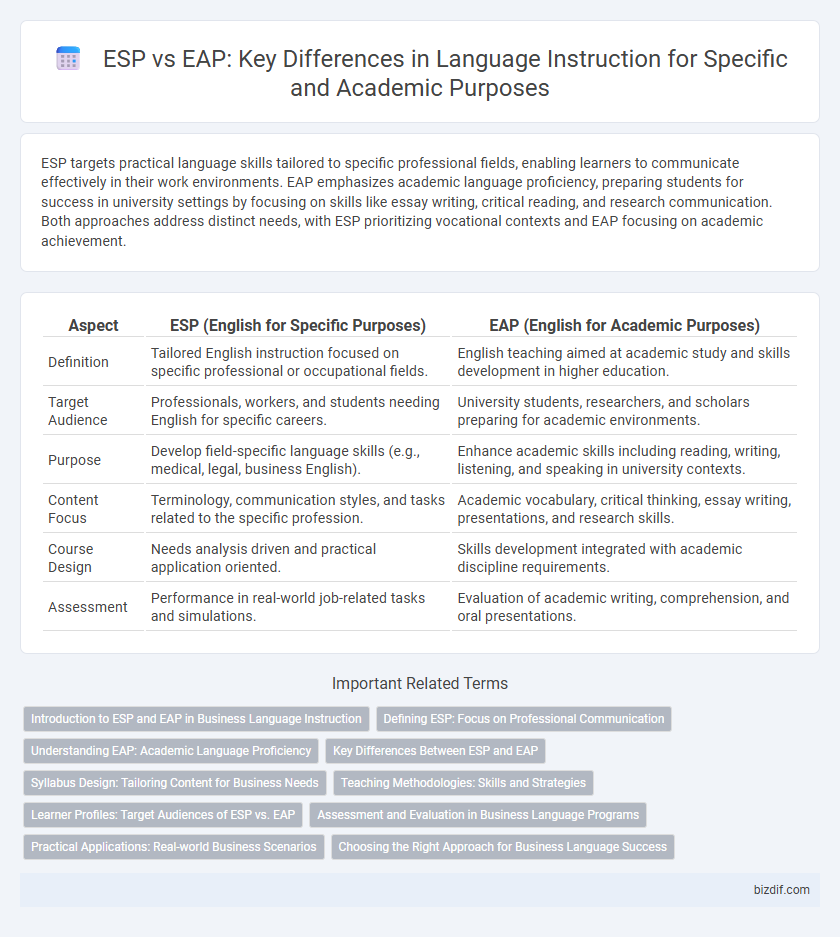ESP targets practical language skills tailored to specific professional fields, enabling learners to communicate effectively in their work environments. EAP emphasizes academic language proficiency, preparing students for success in university settings by focusing on skills like essay writing, critical reading, and research communication. Both approaches address distinct needs, with ESP prioritizing vocational contexts and EAP focusing on academic achievement.
Table of Comparison
| Aspect | ESP (English for Specific Purposes) | EAP (English for Academic Purposes) |
|---|---|---|
| Definition | Tailored English instruction focused on specific professional or occupational fields. | English teaching aimed at academic study and skills development in higher education. |
| Target Audience | Professionals, workers, and students needing English for specific careers. | University students, researchers, and scholars preparing for academic environments. |
| Purpose | Develop field-specific language skills (e.g., medical, legal, business English). | Enhance academic skills including reading, writing, listening, and speaking in university contexts. |
| Content Focus | Terminology, communication styles, and tasks related to the specific profession. | Academic vocabulary, critical thinking, essay writing, presentations, and research skills. |
| Course Design | Needs analysis driven and practical application oriented. | Skills development integrated with academic discipline requirements. |
| Assessment | Performance in real-world job-related tasks and simulations. | Evaluation of academic writing, comprehension, and oral presentations. |
Introduction to ESP and EAP in Business Language Instruction
ESP (English for Specific Purposes) focuses on tailored language skills targeting specific professional fields, such as business communication, negotiations, and industry-specific terminology. EAP (English for Academic Purposes) emphasizes language proficiency needed for academic settings, including research writing, presentations, and comprehension of scholarly texts. In business language instruction, ESP prioritizes practical communication skills aligned with workplace contexts, while EAP develops critical thinking and academic literacy for business studies.
Defining ESP: Focus on Professional Communication
ESP (English for Specific Purposes) targets learners aiming to acquire English skills tailored to specific professions such as healthcare, engineering, or law, emphasizing industry-specific terminology and communication practices. The curriculum prioritizes practical language use relevant to workplace scenarios, including reports, presentations, and client interactions. This focus on professional communication ensures learners effectively meet the linguistic demands of their specialized fields.
Understanding EAP: Academic Language Proficiency
English for Academic Purposes (EAP) targets the development of specialized academic language skills essential for success in higher education, such as critical reading, academic writing, and formal presentations. EAP emphasizes the mastery of discipline-specific vocabulary, complex sentence structures, and cohesive argumentation to meet the rigorous demands of academic discourse. This focused language proficiency supports non-native speakers in effectively engaging with scholarly texts, participating in seminars, and producing research-based assignments.
Key Differences Between ESP and EAP
ESP (English for Specific Purposes) targets language skills tailored to specific professions or industries such as business, medicine, or engineering, emphasizing practical vocabulary and communication tasks relevant to those fields. EAP (English for Academic Purposes) concentrates on academic language proficiency needed for studying at universities, including skills like essay writing, critical reading, and academic presentations. The key difference lies in ESP's focus on workplace or professional contexts, whereas EAP is designed to support academic achievement and research capabilities.
Syllabus Design: Tailoring Content for Business Needs
ESP syllabus design centers on customizing content to meet specific professional or occupational requirements, emphasizing practical language skills relevant to industry contexts such as finance, marketing, or engineering. EAP syllabus design prioritizes developing students' academic language proficiency, focusing on skills like critical reading, academic writing, and presentation tailored to university coursework. Effective syllabi in both ESP and EAP incorporate authentic materials and task-based activities that align with learners' goals, ensuring relevance and engagement in language learning.
Teaching Methodologies: Skills and Strategies
ESP teaching methodologies emphasize targeted skills and practical strategies designed to meet specific professional and vocational language needs, incorporating authentic materials and task-based learning. EAP methodologies focus on academic skills development such as critical reading, essay writing, and research communication, employing scaffolded instruction to enhance academic literacy and analytical thinking. Both approaches integrate learner-centered techniques but differ in objective-driven content and skill specialization tailored to professional versus academic contexts.
Learner Profiles: Target Audiences of ESP vs. EAP
ESP targets professionals and workers seeking language skills tailored to specific industries such as healthcare, engineering, or business, emphasizing practical vocabulary and industry-specific communication. EAP focuses on students and academic researchers who need proficiency in academic writing, reading, and presentations for successful participation in higher education. The distinct learner profiles dictate the customization of content and teaching methods to meet the contextual demands of professional versus academic environments.
Assessment and Evaluation in Business Language Programs
Assessment in ESP business language programs emphasizes practical tasks such as negotiations, presentations, and report writing to measure learners' ability to perform real-world business functions. In contrast, EAP evaluation prioritizes academic skills like essay writing, research, and critical reading to prepare students for university-level study. Both approaches utilize tailored rubrics and performance-based assessments to ensure targeted language competencies are effectively measured.
Practical Applications: Real-world Business Scenarios
ESP targets specialized professional fields such as law, medicine, and engineering, providing learners with industry-specific vocabulary and communication skills essential for workplace efficiency. EAP concentrates on academic contexts, equipping students with skills to comprehend and produce research papers, presentations, and lectures in English. Practical applications in real-world business scenarios favor ESP by developing concise report writing, negotiation language, and email etiquette tailored to corporate environments.
Choosing the Right Approach for Business Language Success
ESP targets industry-specific language skills tailored to professional contexts such as finance, marketing, and management, enhancing workplace communication and job performance. EAP concentrates on academic language proficiency, preparing learners for research, presentations, and academic writing within universities and colleges. Selecting ESP aligns with clear business objectives, while EAP supports academic career paths, making the choice critical for achieving targeted language success in business environments.
ESP (English for Specific Purposes) vs EAP (English for Academic Purposes) Infographic

 bizdif.com
bizdif.com